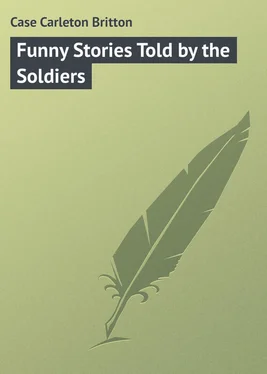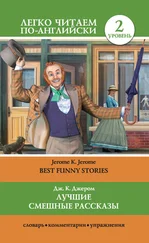Carleton Case - Funny Stories Told by the Soldiers
Здесь есть возможность читать онлайн «Carleton Case - Funny Stories Told by the Soldiers» — ознакомительный отрывок электронной книги совершенно бесплатно, а после прочтения отрывка купить полную версию. В некоторых случаях можно слушать аудио, скачать через торрент в формате fb2 и присутствует краткое содержание. ISBN: , Жанр: foreign_prose, foreign_humor, на английском языке. Описание произведения, (предисловие) а так же отзывы посетителей доступны на портале библиотеки ЛибКат.
- Название:Funny Stories Told by the Soldiers
- Автор:
- Жанр:
- Год:неизвестен
- ISBN:http://www.gutenberg.org/ebooks/48168
- Рейтинг книги:5 / 5. Голосов: 1
-
Избранное:Добавить в избранное
- Отзывы:
-
Ваша оценка:
- 100
- 1
- 2
- 3
- 4
- 5
Funny Stories Told by the Soldiers: краткое содержание, описание и аннотация
Предлагаем к чтению аннотацию, описание, краткое содержание или предисловие (зависит от того, что написал сам автор книги «Funny Stories Told by the Soldiers»). Если вы не нашли необходимую информацию о книге — напишите в комментариях, мы постараемся отыскать её.
Funny Stories Told by the Soldiers — читать онлайн ознакомительный отрывок
Ниже представлен текст книги, разбитый по страницам. Система сохранения места последней прочитанной страницы, позволяет с удобством читать онлайн бесплатно книгу «Funny Stories Told by the Soldiers», без необходимости каждый раз заново искать на чём Вы остановились. Поставьте закладку, и сможете в любой момент перейти на страницу, на которой закончили чтение.
Интервал:
Закладка:
He has just the quality of voice that got down deep over here, when the night was dark and damp and the dim light but half illuminated the place, and the boys naturally were letting their thoughts fly back home. They warmed up to him, for he’s a good scout, according to their way of thinking, and the first thing they knew he was asking them to call for any song they would like to hear. About the first voice that responded called for the “Long, Long Trail.”
“All right, men,” he said, with a sincere smile, and his magnetic face, beneath the wavy black hair, seemed to exude a hypnotic fascination. He nodded to his pianist and they started. The barracks, or hut, or camp resounded with the “Long Trail.”
“Fine, fine,” beamed Rodey from the rough board platform. “You know, men, that’s a mighty fine piece of music. Let’s sing it again; now, all together,” and the sound swells a little higher this time.
“Once more,” and Rodey waved his arm in lieu of a baton.
The sea of faces brightened perceptibly, even under the dim lights.
“Now, men,” said Rodey, “just sing that chorus over again and I’ll try the trombone.”
That trombone did the business. Rodey gets a sort of combination alto and tenor harmony out of that old trombone that brings the home folks right into the meeting.
“Now, men, once more, very softly,” and he played the harmony plaintively and fetchingly.
He’s got ’em, and the moment has arrived for sprinkling the sawdust.
“Before we go on with our little program, men,” he said, “let us just bow our heads for a minute in prayer and ask God to help us make the good fight, help us to do the work we came over here to do like men.” The men bowed their heads and he added:
“Just before we ask God’s blessing on these brave men, if there is a boy out there who feels that he has not been living quite as he knows his mother would like to have him live, if there is a boy out there who feels in an especial way the need of God’s help at this hour, will he please raise his hand.”
The place was very still. A hand went up way in the back.
“Yes,” Rodey said. “God bless you, boy.”
Then another and another, and soon scores of hands were held up, while they had their heads bowed.
Then Rodey prayed one of those conversational prayers, and he made it a personal appeal for each one of the boys whose hands had gone up.
It was not Rodey’s plan to send the boys back to their barracks with only seriousness and longing in their heads. He’s one of the most adroit handlers of an audience in Europe. He’d got the main idea planted and now he broke into smiles and there was an infectious laugh in his voice.
He was again talking to red-blooded men who were going out to fight. So he told a few corking stories, humorous but clean, and got down to them instead of talking over them. He was one of ’em. He wanted to send them away with a good taste in their mouths.
Dunbar’s “When Melinda Sings” he does to perfection. Once in awhile he pulls the “Hunk o’ Tin” parody on the Kipling poem.
Then they sing some more, both democratic music and old hymns, and finally they all stand up, after he has launched a two-minute patriotic talk that thrills, and sing “The Star-Spangled Banner.”
Rodey never has a set program. He sizes up each new audience with a glance and in two minutes knows about what line of entertainment he ought to give them. If it’s a crowd that likes good stories, they get it. If it is a meeting that likes a Bible talk, they get that, and the great Sunday himself hasn’t much on his pupil in that line. But he never lets a crowd get away with a solemn face. He leads them up the hill and down the hill, and finally sends them back to the blankets feeling refreshed, inspirited, and cheerful.
And when Rodey hit a camp of Negro troops – man, O man! what he did to them!
He thinks the war has been a holy war, a war of crusaders against the terrible Huns, and wants them beaten to a standstill. He insists on the knockout punch, and believes the world will be a better world for everybody after Fritz and his gang have been completely chastized. – Charles N. Wheeler, in The Chicago Tribune .
HIS OWN PERSONAL WAR
General Leonard Wood tells the story of a captain to whom was assigned a new orderly, a fresh recruit. “Your work will be to clean my boots, buttons, belt, and so forth, shave me, see to my horse, which you must groom thoroughly, and clean the equipment. After that you go to your hut, help to serve the breakfast, and after breakfast lend a hand washing up. At eight o’clock you go on parade and drill till twelve o’clock – ”
“Excuse me, sir,” broke in the recruit, “is there anyone else in the army besides me?”
WHEN TOMMY LAUGHS
There are many bright lines in the soldiers’ letters home, as Punch and other papers note.
“A clergyman recently gave a lecture on ‘Fools’ at the ‘hut’ back of our station,” writes a boy from the Somme. “The tickets of admission were inscribed, ‘Lecture on Fools. Admit one.’ There was a large audience.”
And from Calais comes this:
“You will note with interest and tell the shirkers they’re missing something here. The ‘G’ came off the big sign east of the station here and we now read: ‘The only English love makers in the city.’”
ONE OF THOSE IRISH BULLS
The recruit from Ireland spent his leave in England. Asked on his return to the front what he thought of the place, he said:
“Faith, London is a great city; but it’s no place for a poor man unless he has plenty of money.”
WHEN GERMANY SALUTED A PIG
A Belgian farmer saved his bacon in an unusual way. He heard that the Germans were coming, so he killed and dressed his one pig, cleaned it, put it into his bed with only a part of the underface exposed, and put a lighted candle at each side of the bed. When the Germans arrived an officer entered the house, went into the room, saw what he believed to be a member of the family laid out for burial, saluted and went out!
AND SO IT PROVED
Arthur Train, the novelist, put down a German newspaper at the Century Club, in New York, with an impatient grunt.
“It says here,” he explained, “that it is Germany who will speak the last word in this war.”
Then the novelist laughed angrily and added:
“Yes, Germany will speak the last word in the war, and that last word will be ‘Kamerad!’”
WASHINGTON GETS THESE, TOO
They have some exceptional letters in the London “Family Separation” office, which looks after the families of soldiers at the front. These are all actual letters received:
“Dear Sir – You have changed my little boy into a little girl. Will it make any difference?
“Respectfully yours, ” – .““My Bill has been put in charge of a spittoon. Will I get more pay?” [“Platoon” was meant.]
“I am glad to tell you that my husband has been reported dead.”
“If I don’t get my husband’s money soon I shall be compelled to go on the streets and lead an Imortal life.”
“Dear Sir – In accordance with instructions on paper, I have given birth to a daughter last week.
“Truly yours, ” – .“BLACK MAGIC
“Yes, sah,” said one negro, “a friend of mine who knows all about it says dis heah man Edison has done gone and invented a magnetized bullet dat can’t miss a German, kase ef dere’s one in a hundred yards de bullet is drawn right smack against his steel helmet. Yes, sah, an’ he’s done invented another one with a return attachment. Whenever dat bullet don’t hit nothin’ it comes right straight back to de American lines.”
Читать дальшеИнтервал:
Закладка:
Похожие книги на «Funny Stories Told by the Soldiers»
Представляем Вашему вниманию похожие книги на «Funny Stories Told by the Soldiers» списком для выбора. Мы отобрали схожую по названию и смыслу литературу в надежде предоставить читателям больше вариантов отыскать новые, интересные, ещё непрочитанные произведения.
Обсуждение, отзывы о книге «Funny Stories Told by the Soldiers» и просто собственные мнения читателей. Оставьте ваши комментарии, напишите, что Вы думаете о произведении, его смысле или главных героях. Укажите что конкретно понравилось, а что нет, и почему Вы так считаете.

![Марк Твен - Смешные рассказы [The Funny Stories]](/books/29189/mark-tven-smeshnye-rasskazy-the-funny-stories-thumb.webp)










